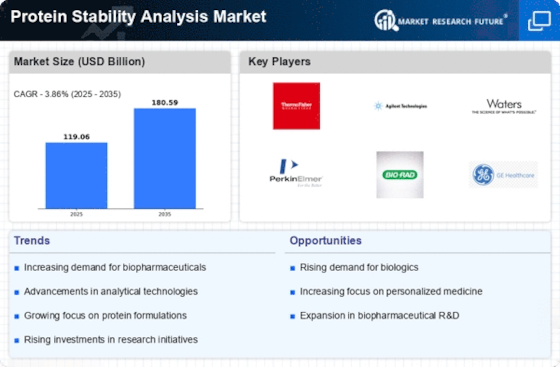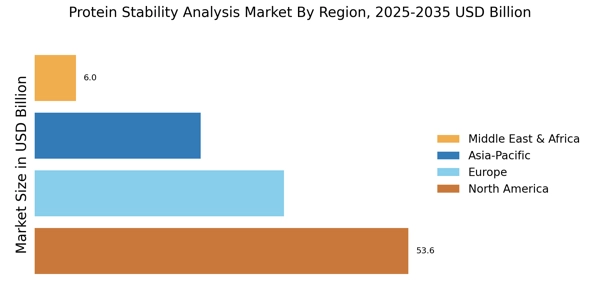Increased Regulatory Scrutiny
The Protein Stability Analysis Market is significantly influenced by the rising regulatory scrutiny surrounding biopharmaceutical products. Regulatory bodies are increasingly mandating comprehensive stability studies to ensure that protein-based drugs maintain their efficacy and safety throughout their shelf life. This trend is evident in the stringent guidelines set forth by agencies, which require detailed stability data as part of the approval process. As a result, pharmaceutical companies are compelled to invest in advanced protein stability analysis techniques to meet these regulatory demands. The market for stability analysis is projected to grow as companies seek to comply with evolving regulations, thereby ensuring that their products are not only effective but also safe for consumer use. This regulatory landscape is likely to shape the Protein Stability Analysis Market, driving innovation and investment in stability testing methodologies.
Rising Focus on Protein Therapeutics
The increasing emphasis on protein therapeutics is a pivotal driver for the Protein Stability Analysis Market. As the biopharmaceutical sector expands, the need for effective protein-based drugs has surged. This trend is underscored by the fact that protein therapeutics account for a substantial portion of the pharmaceutical market, with projections indicating a growth rate of approximately 8% annually. Consequently, the demand for robust protein stability analysis becomes critical to ensure the efficacy and safety of these therapeutics. Companies are investing in advanced analytical techniques to assess protein stability, which is essential for regulatory compliance and product development. This heightened focus on protein therapeutics is likely to propel the Protein Stability Analysis Market forward, as stakeholders seek to optimize formulations and enhance the shelf life of these vital products.
Emerging Markets and Increased Accessibility
Emerging markets are playing an increasingly vital role in the Protein Stability Analysis Market. As economies develop, there is a growing demand for biopharmaceutical products, leading to an expansion of the protein stability analysis sector. Countries in Asia and Latin America are witnessing a rise in biopharmaceutical manufacturing, which necessitates the implementation of stability testing protocols to ensure product quality. This trend is further supported by the increasing accessibility of advanced analytical technologies, which are becoming more affordable and available to researchers in these regions. The expansion of the Protein Stability Analysis Market in emerging markets is likely to be driven by local investments and collaborations, fostering innovation and enhancing the overall landscape of protein stability analysis.
Technological Innovations in Analytical Tools
Technological innovations in analytical tools are transforming the Protein Stability Analysis Market. The advent of sophisticated techniques such as differential scanning calorimetry and high-performance liquid chromatography has enhanced the ability to assess protein stability with greater precision. These advancements enable researchers to identify stability issues early in the development process, thereby reducing the risk of product failure. The market for these analytical tools is expected to witness substantial growth, driven by the increasing need for accurate stability assessments in protein formulations. Furthermore, the integration of automation and artificial intelligence in analytical processes is likely to streamline workflows and improve data accuracy. As a result, the Protein Stability Analysis Market is poised for expansion, as companies adopt these cutting-edge technologies to enhance their stability analysis capabilities.
Growing Investment in Biopharmaceutical Research
The surge in investment in biopharmaceutical research is a key driver for the Protein Stability Analysis Market. With the increasing prevalence of chronic diseases and the aging population, there is a pressing need for innovative therapeutic solutions. This has led to a significant rise in funding for biopharmaceutical research, with estimates suggesting that global investment in this sector could reach over 300 billion by 2026. As research initiatives expand, the demand for protein stability analysis becomes paramount to ensure the successful development of new therapies. Companies are recognizing the importance of stability testing in the drug development pipeline, which is likely to bolster the Protein Stability Analysis Market. This trend indicates a robust future for stability analysis as a critical component of biopharmaceutical research and development.

















